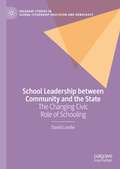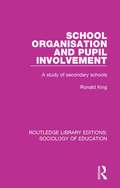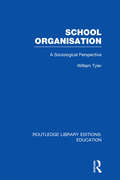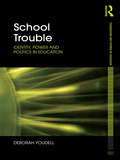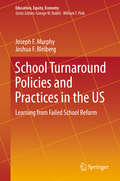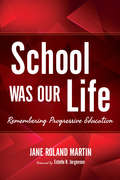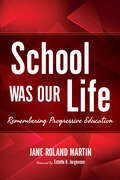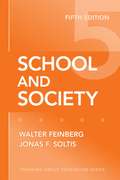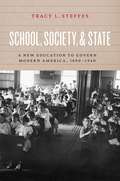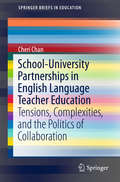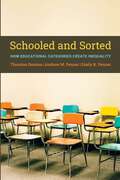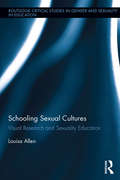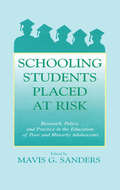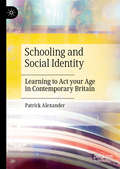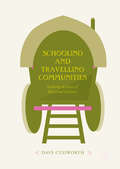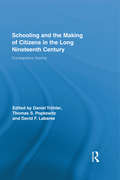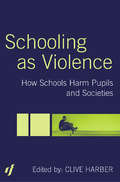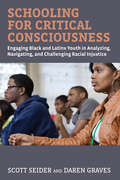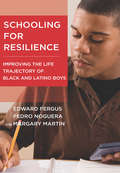- Table View
- List View
School Knowledge for the Masses: World Models and National Primary Curricular Categories in the Twentieth Century (Routledge Library Editions: Sociology of Education #36)
by John W. Meyer David Kamens Aaron BenavotFirst published in 1992, this book presents unique quantitative data on the content coverage of primary education in a large number of countries since 1920. It demonstrates that these curricular outlines tend to be surprisingly similar across very disparate countries, and suggests the world processes that produced this result. Specifically, the study shows that the contemporary primary curriculum dates from changes in the late nineteenth century; that there has been a general shift towards a ‘social studies’ subject; that instruction in mathematics and sciences has tended to expand; that there have been substantial increases in foreign language instruction (and changes in the languages taught); and that instruction in the arts and physical education come to the standard world education model much later than other subjects. This work will be of particular interest to those studying primary curriculum, international education and the sociology of education.
School Leadership and Administration: The Cultural Context (Reference Books in International Education)
by Allan Walker Clive DimmockThis text calls for a broader approach to comparative educational administration: one which uses culture as the principle means of analysis. The articles collected by Allan Walker and Clive Dimmock detail the educational practices and outcomes of other systems while taking into account the mediating influence of culture. In this way, these essays stress the specific aspects of the cultures studied, and map out common ground for the study of administrators' values, beliefs, and actions.
School Leadership between Community and the State: The Changing Civic Role of Schooling (Palgrave Studies in Global Citizenship Education and Democracy)
by David LundieThis book presents changes in UK and global educational governance in the context of a radical shift in the operating logics of politics and its interaction with education. Beginning from the colonial origins of political interest in education, the author traces a fundamental shift in the patterns of governance of schools in England in the opening decades of the 21st century. Operating through the logics of public choice economics involving both real markets and quasi-markets, policy reforms have increasingly framed school values, and the value of schooling, in line with a politically determined and nostalgic discourse of ‘British values’. This stands in contrast to a previous focus on ‘community cohesion’ which foregrounded school partnership with the parent community and wider society. Tracing the processes and mid-level actors mediating between government and school leaders, the author identifies processes of recontextualisation through which policy can be reinscribed and resisted.
School Organisation and Pupil Involvement: A study of secondary schools (Routledge Library Editions: Sociology of Education #31)
by Ronald KingFirst published in 1973, this book is based on research carried about by Ronald King on integral parts of school organisation, including the assembly, uniform, rewards and punishments, games and out-of-school activities, curriculum, prefectorial system and school councils, in a sample of seventy-two schools. It measures and explores the level of pupils’ involvement in the school, in terms in their evaluations and effective dispositions, in relation to pupil age, sex and social background. This book will be a valuable resource for those studying the sociology and history of education, as well as educational research and school organisation.
School Organisation: A Sociological Perspective (Routledge Library Editions: Education)
by William TylerThe internal organisation of the school touches on many areas of contemporary debate. Is there such a thing as a ‘good school’? Are large urban comprehensives necessarily impersonal? Are the charges of indiscipline, conflict and declining standards in modern schools based on a failure to understand schools as institutions? At the time this book was first published sociological analysis had neglected to consider schools as organisational entities, preferring to see them as either the sites for negotiated encounters between teachers and pupils or else as agencies of class reproduction. The author redresses this imbalance and by relating the various literatures on the school to the constitutive patterns of its internal organisation he demonstrates the need for a more intensive sociological study of this embattled institution.
School Segregation and Social Cohesion in Santiago: Perspectives from the Chilean Experience (International Study of City Youth Education #3)
by Andres MolinaThis book examines the consequences of educational segregation from the perspective of social cohesion. It investigates the impact of separating students along socioeconomic lines on student attitudes, dispositions and outlooks considered important for social cohesion as well as on achievement, opening the discussion about the social costs of school segregation. The separation of students based on their social background is a common feature of schooling in many modern systems. This is not only due to the influence of residential segregation but also to the effects of policies promoting educational privatisation, parental choice and student academic selection. By recognising the importance of schooling for citizenship and social integration, the chapters in this book explore how the separation of students throughout their school lives can contribute to the division of citizens beyond school, and how social segregation in school systems affect social cohesion more broadly.By exploring the case of Santiago, Chile, the study is a timely contribution to the understanding of the roots of social division and the role that schools play in creating cohesive societies. The originality of the approach and the evidence presented draw on implications that should be of interest to a wider audience concerned with contemporary discussions on solidarity and its erosion by educational segregation in urban environments.
School Trouble: Identity, Power and Politics in Education (Foundations and Futures of Education)
by Deborah YoudellWhat is the trouble with schools and why should we want to make ‘school trouble’? Schooling is implicated in the making of educational and social exclusions and inequalities as well as the making of particular sorts of students and teachers. For this reason schools are important sites of counter- or radical- politics. In this book, Deborah Youdell brings together theories of counter-politics and radical traditions in education to make sense of the politics of daily life inside schools and explores a range of resources for thinking about and enacting political practices that make ‘school trouble’. The book offers a solid introduction to the much-debated issues of ‘intersectionality’ and the limits of identity politics and the relationship between schooling and the wider policy and political context. It pieces together a series of tools and tactics that might destabilize educational inequalities by unsettling the knowledges, meanings, practices, subjectivities and feelings that are normalized and privileged in the ‘business as usual’ of school life. Engaging with curriculum materials, teachers’ lesson plans and accounts of their pedagogy, and ethnographic observations of school practices, the book investigates a range of empirical examples of critical action in school, from overt political action pursued by educators to day-to-day pedagogic encounters between teachers and students. The book draws on the work of Michel Foucault, Judith Butler, Ernesto Laclau and Chantel Mouffe, and Gilles Deleuze and Felix Guattari to make sense of these practices and identify the political possibilities for educators who refuse to accept the everyday injustices and wide-reaching social inequalities that face us. School Trouble appears at a moment of political and economic flux and uncertainty, and when the policy moves that have promoted markets and private sector involvement in education around the globe have been subject to intense scrutiny and critique. Against this backdrop, renewed attention is being paid to the questions of how politics might be rejuvenated, how societies might be made fair, and what role education might have in pursing this. This book makes an important intervention into this terrain. By exploring a politics of discourse, an anti-identity politics, a politics of feeling, and a politics of becoming, it shows how the education assemblage can be unsettled and education can be re-imagined. The book will be of interest to advanced undergraduate and postgraduate students and scholars in the fields of education, sociology, cultural studies, and social and political science as well as to critical educators looking for new tools for thinking about their practice.
School Turnaround Policies and Practices in the US: Learning From Failed School Reform (Education, Equity, Economy Ser. #6)
by Joseph F. Murphy Joshua F. BleibergThis volume provides an analysis of what we know about turning around "failing" schools in the United States. It starts with an in-depth examination of the barriers that hinder action on turnaround work.The book analyses the reasons why some schools that find themselves in serious academic trouble fail in their efforts to turn themselves around. Beginning with a discussion of what may best be described as "lethal" reasons or the most powerful explanation for failed reform initiatives, which include an absence of attention to student care and support; a near absence of attention to curriculum and instruction; the firing of the wrong people. Covered in this volume are "critical" explanations for failed turnaround efforts such as failure to attend to issues of sustainability, and "significant" explanations for failed turnaround efforts such as the misuse of test data. The volume concludes by examining what can be done to overcome problems that cause failure for turnaround schools and reviewing ideas in the core technology of schooling: curriculum, instruction, and assessment. As well as exploring problems associated with the leadership and management of schools to see where improvement is possible and an analysis of opportunities found in relationships between schools and their external partners such as parents and community members.
School Uniforms: New Materialist Perspectives (The Cultural and Social Foundations of Education)
by Rachel Shanks Julie Ovington Beth Cross Ainsley CarnarvonThis edited volume brings together a new materialist approach to understanding the various legacies and controls being exercised through school uniforms. Through examining school uniform policies, the editors and their authors highlight the embodied choices that contribute to a socio-materialist understanding of democracy and social justice. Uniform policy plays a distinct role in setting the culture of compulsory school education and as such it constitutes a set of under-theorised school practices. This work thus brings together critical perspectives from education, sociology, cultural and postcolonial studies within an overarching analysis of how uniform imposes performances that have a formative effect on young people’s identities and economic positionality.
School Violence in South Korea: International Comparative Analysis
by Seunghee HanThis book examines school violence in South Korea from an international comparative perspective. It analyses nationally representative samples and provides extensive literature reviews based on academic journals, various social and educational magazines and major media articles on school violence in South Korea. This book includes major data sets for the analysis such as Trends in International Mathematics and Science Study and Nation Youth Policy Institute. These data show frequency, patterns and associated factors of school violence in South Korea and comparison of those in Japan and the United States.
School Was Our Life: Remembering Progressive Education (Counterpoints: Music and Education)
by Estelle R. Jorgensen Jane Roland MartinThe late 1930s and early 1940s were the peak of progressive education in the United States, and Elisabeth Irwin's Little Red School House in New York City was iconic in that movement. For the first time, stories and recollections from students who attended Little Red during this era have been collected by author Jane Roland Martin. Now in their late eighties, these classmates can still sing the songs they learned in elementary school and credit the progressive education they loved with shaping their outlooks and life trajectories. Martin frames these stories from the former students "tell it like it was" point of view with philosophical commentary, bringing to light the underpinnings of the kind of progressive education employed at Little Red and commenting critically on the endeavor. In a time when the role of the arts in education and public schooling itself are under attack in the United States, Martin makes a case for a different style of education designed for the defense of democracy and expresses hope that an education like hers can become an opportunity for all.
School Was Our Life: Remembering Progressive Education (Counterpoints: Music and Education)
by Jane Roland MartinPersonal accounts of the early days of New York City’s Little Red School House, analysis of its success, and a look at the future of education.The late 1930s and early 1940s were the peak of progressive education in the United States, and Elisabeth Irwin’s Little Red School House in New York City was iconic in that movement. For the first time, stories and recollections from students who attended Little Red during this era have been collected by author Jane Roland Martin. Now in their late eighties, these classmates can still sing the songs they learned in elementary school and credit the progressive education they loved with shaping their outlooks and life trajectories. Martin frames these stories from the former students “tell it like it was” point of view with philosophical commentary, bringing to light the underpinnings of the kind of progressive education employed at Little Red and commenting critically on the endeavor. In a time when the role of the arts in education and public schooling itself are under attack in the United States, Martin makes a case for a different style of education designed for the defense of democracy and expresses hope that an education like hers can become an opportunity for all.“This sparkling, intimate, and delightfully written memoir demonstrates conclusively how and why elementary education should be designed to fit the natural growth of the human mind.” —E.O. Wilson author of The Social Conquest of Earth“Drawing on her own experiences 75 years ago and those of her classmates, researchers and many others, [Jane Roland Martin] has made it clear why we, even though she and the rest of us privileged to have gone through Little Red can’t write cursive and never had to memorize facts and figures, are “The Lucky Ones.” She draws on memories of everything from class trips, to writing poetry, to group singing to explain why much of the conventional literature about progressive education has missed the story. If it’s too late for you to apply (or send your children and/or grandchildren) to Little Red, read School Was Our Life: Remembering Progressive Education. It’s the next best thing.” —Victor S. Navasky, publisher emeritus of The Nation
School and Society
by Jonas F. Soltis Walter Feinberg Pamela WolfbergThis widely used text has been expanded to include the most important issues in contemporary schooling, including new end-of-chapter sections for Further Reading and new references added to the useful Additional Resources section. School and Society, Fifth Edition uses realistic case studies, dialogues, and open-ended questions designed to stimulate thinking about problems related to school and society, including curriculum reform, social justice, and competing forms of research. Written in a style that speaks directly to today's educator, this book tackles such crucial questions as: Do schools socialize students to become productive workers? * Does schooling reproduce social class and pass on ethnic and gender biases? * Can a teacher avoid passing on dominant social and cultural values? * What besides subjects do students really learn in schools? School and Society is one of the five books in the highly regarded Teachers College Press Thinking About Education Series, now in its Fifth Edition. All of the books in this series are designed to help pre- and in-service teachers bridge the gap between theory and practice.
School, Family, and Community Partnerships
by Joyce L. EpsteinUpdated and revised throughout, Joyce EpsteinOCOs classic book provides a framework for thinking about, talking about, and actually building comprehensive programs for school and family partnerships.
School, Society, & State: A New Education to Govern Modern America,1890-1940
by Steffes Tracy L."Democracy has to be born anew every generation, and education is its midwife," wrote John Dewey in his classic work The School and Society. In School, Society, and State, Tracy Steffes places that idea at the center of her exploration of the connections between public school reform in the early twentieth century and American political development from 1890 to 1940. American public schooling, Steffes shows, was not merely another reform project of the Progressive Era, but a central one. She addresses why Americans invested in public education and explains how an array of reformers subtly transformed schooling into a tool of social governance to address the consequences of industrialization and urbanization. By extending the reach of schools, broadening their mandate, and expanding their authority over the well-being of children, the state assumed a defining role in the education--and in the lives--of American families. In School, Society, and State, Steffes returns the state to the study of the history of education and brings the schools back into our discussion of state power during a pivotal moment in American political development.
School-University Partnerships in English Language Teacher Education
by Cheri ChanThis book addresses the complex issues that arise in school-university collaborative action research projects. Employing sociocultural perspectives on examining professional practices of in-service teachers, it examines the complexities of negotiating beliefs, identities and interpersonal relations when educators from two different institutional cultures collaborate. Specifically, the book explores issues such as the discourses that are operative in school-university collaboration for English language teacher education; the way in which beliefs, interpersonal relations and identities are negotiated in school-university partnership; what tensions and complexities operate in collaborative action research discourse in an educational context; and how school-university collaboration can be achieved. The book adopts a critical perspective and provides arguments from a non-Western sociocultural perspective.
Schooled and Sorted: How Educational Categories Create Inequality
by Thurston Domina Andrew M. Penner Emily K. PennerSociety primarily views education as a way to teach students skills and knowledge that they will draw upon as they move into their adult lives. However, schools do more than educate students – they also place students into categories, such as kindergartner, English language learner, and honor roll student. But do these categories have larger consequences than simply sorting students into classrooms? In Schooled & Sorted Thurston Domina, Andrew M. Penner, and Emily K. Penner, explore how educational categories reify and reinforce powerful existing social categories – including race, ethnicity, and class – and ultimately reproduce social and economic inequality in broader society. Domina and colleagues argue that while education is often seen as a tool for social mobility and reducing inequality, categories used in schools shape students’ access to resources, which ultimately have far-reaching impacts on their lives. The authors assert that the classes students are sorted into influence their educational experiences – students who are placed in higher-tracked classes are believed to have stronger academic skills than students in lower-tracked classes. As a result, more resources are often devoted to students in higher-tracked classes. Because many measures of academic achievement reflect values of the status quo, white, affluent students are overrepresented in these track assignments, leading to a reproduction of societal status and resource inequality within schools. This inequality within schools translates into lasting inequalities in the adult world. Society views educational achievement to be based on merit – high achievers have done well because they worked hard and are rewarded with resources, status, and power, including high-paying, high-status jobs at prestigious organizations. Those with lower educational status, on the other hand, are seen as undeserving and are therefore sorted into lower-paid jobs in lower-status professions and hold less influence. Domina and colleagues contend, however, that while educational categorization is unavoidable, a more equitable system, and thus a more equitable society, can be built. A key component is to build and uphold categories that emphasize educational goods that are inherently valuable, such as the ability to read, as opposed to those that derive value from scarcity, such as status and prestige. Schooled & Sorted is an illuminating investigation into the ways sorting within schools translates to sorting – and inequality – into the larger world.
Schooling Sexual Cultures: Visual Research in Sexuality Education (Routledge Critical Studies in Gender and Sexuality in Education)
by Louisa AllenMoving beyond the traditional focus on curriculum and pedagogy, this volume explores hidden dimensions of sexuality education in schools and how sexual meanings are produced. Challenging the standard understandings of sexuality education, Allen discusses how students’ knowledge of sexualities is often learnt outside the ‘official’ school curriculum in informal spaces such as the sports field, gym locker rooms and peer groups. By employing visual methods and analysing student photo-diaries, Allen’s original book captures a sexual culture of schooling that allow readers to literally ‘see through young people’s eyes.’ Introducing theoretical ideas in relation to queer theory and ‘new’ feminist new materialisms, this volume calls for a re-conceptualization of how sexuality comes into being at school, in order to take account of its material, spatial and embodied elements.
Schooling Students Placed at Risk: Research, Policy, and Practice in the Education of Poor and Minority Adolescents
by Mavis G. SandersThis book examines historical approaches and current research and practice related to the education of adolescents placed at risk of school failure as a result of social and economic conditions. One major goal is to expand the intellectual exchange among researchers, policymakers, practitioners, and concerned citizens on factors influencing the achievement of poor and minority youth, specifically students in middle and high schools. Another is to encourage increased dialogue about policies and practices that can make a difference in educational opportunities and outcomes for these students. Although the chapters in this volume are not exhaustive, they represent an array of theoretical and methodological approaches that provide readers with new and diverse ways to think about issues of educational equality and opportunity in the United States. A premise that runs through each chapter is that school success is possible for poor and minority adolescents if adequate support from the school, family, and community is available. *The conceptual approach (Section I) places the research and practice on students placed at risk in a historical context and sets the stage for an important reframing of current definitions, research, policies, and practices aimed at this population. *Multiple research methodologies (Sections II and III) allow for comparisons across racial and ethnic groups as well as within groups, and contribute to different and complementary insights. Section III, "Focus on African-American Students," specifically addresses gender and social class differences among African-American adolescents. *Current reform strategies presently being implemented in schools throughout the United States are presented and discussed (Part IV). These strategies or programs highlight how schools, families, and communities can apply research findings like the ones this book presents, thus bridging the often wide gap between social science research and educational practice.
Schooling and Social Identity: Learning to Act your Age in Contemporary Britain
by Patrick AlexanderThis book examines the nature of age as an aspect of social identity and its relationship to experiences of formal education. Providing a new and critical approach to debates about age and social identity, the author explores why age remains such an important aspect of self-making in contemporary society. Through an ethnographic account of a secondary school in the south-east of England, the author poses three principal questions. Why are schools in English organised according to age? How do pupils and teachers learn to ‘act their age’ while at school? Ultimately, why does age remain such an important and complex organising concept for modern society? Cutting across lines of class and gender, this timely book will be of interest to students and scholars of self-making and identity in educational contexts, and others interested in how schooling socialises young people into categories of age as the foundational building blocks of modern society.
Schooling and Travelling Communities: Exploring the Spaces of Educational Exclusion
by Dave CudworthThis book calls for a re-thinking of educational provision for Gypsy / Traveller communities. Despite having been recognised by the government and educational providers for over fifty years, underachievement of children from Gypsy / Traveller communities persists. Rather than focusing specifically on access, attendance and attainment, the author provides a structural analysis of the cultural tensions that often exist between Nomadic communities and current school provision based on the interests and values of Sedentarism. The author uses spatial theory as a base upon which to build knowledge and understanding of the educational exclusion of children from Gypsy / Traveller communities, highlighting the social role that space plays within schools. This innovative book will be of interest and value for students and scholars interested in not only education and Gypsy / Traveller communities, but education for minority communities more widely.
Schooling and the Making of Citizens in the Long Nineteenth Century: Comparative Visions (Routledge Research in Education)
by David F. Labaree Thomas S. Popkewitz Daniel TröhlerThis book is a comparative history that explores the social, cultural, and political formation of the modern nation through the construction of public schooling. It asks how modern school systems arose in a variety of different republics and non-republics across four continents during the period from the late eighteenth century to the early twentieth century. The authors begin with the republican preoccupation with civic virtue – the need to overcome self-interest in order to take up the common interest – which requires a form of education that can produce individuals who are capable of self-guided rational action for the public good. They then ask how these educational preoccupations led to the emergence of modern school systems in a disparate array of national contexts, even those that were not republican. By examining historical changes in republicanism across time and space, the authors explore central epistemologies that connect the modern individual to community and citizenship through the medium of schooling. Ideas of the individual were reformulated in the nineteenth century in reaction to new ideas about justice, social order, and progress, and the organization and pedagogy of the school turned these changes into a way to transform the self into the citizen.
Schooling as Violence: How Schools Harm Pupils and Societies
by Clive HarberAsking fundamental and often uncomfortable questions about the nature and purposes of formal education, this book explores the three main ways of looking at the relationship between formal education, individuals and society: * that education improves society* that education reproduces society exactly as it is* that education makes society worse and harms individuals. Whilst educational policy documents and much academic writing and research stresses the first function and occasionally make reference to the second, the third is largely played down or ignored. In this unique and thought-provoking book, Clive Harber argues that while schooling can play a positive role, violence towards children originating in the schools system itself is common, systematic and widespread internationally and that schools play a significant role in encouraging violence in wider society. Topics covered include physical punishment, learning to hate others, sexual abuse, stress and anxiety, and the militarization of school. The book both provides detailed evidence of such forms of violence and sets out an analysis of schooling that explains why they occur. In contrast, the final chapter explores existing alternative forms of education which are aimed at the development of democracy and peace. This book should be read by anyone involved in education - from students and academics to policy-makers and practitioners around the world.
Schooling for Critical Consciousness: Engaging Black and Latinx Youth in Analyzing, Navigating, and Challenging Racial Injustice
by Scott Seider Daren GravesSchooling for Critical Consciousness addresses how schools can help Black and Latinx youth resist the negative effects of racial injustice and challenge its root causes. Scott Seider and Daren Graves draw on a four-year longitudinal study examining how five different mission-driven urban high schools foster critical consciousness among their students. The book presents vivid portraits of the schools as they implement various programs and practices, and traces the impact of these approaches on the students themselves. The authors make a unique contribution to the existing scholarship on critical consciousness and culturally responsive teaching by comparing the roles of different schooling models in fostering various dimensions of critical consciousness and identifying specific programming and practices that contributed to this work. Through their research with more than 300 hundred students of color, Seider and Graves aim to help educators strengthen their capacity to support young people in learning to analyze, navigate, and challenge racial injustice.Schooling for Critical Consciousness provides school leaders and educators with specific programming and practices they can incorporate into their own school contexts to support the critical consciousness development of the youth they serve.
Schooling for Resilience: Improving the Life Trajectory of Black and Latino Boys (Youth Development and Education Series)
by Pedro Noguera Edward Fergus Margary MartinAs a group, Black and Latino boys face persistent and devastating disparities in achievement when compared to their White counterparts: they are more likely to obtain low test scores and grades, be categorized as learning disabled, be absent from honors and gifted programs, and be overrepresented among students who are suspended and expelled from school. They are also less likely to enroll in college and more likely to drop out. Put simply, they are among the most vulnerable populations in our schools.Schooling for Resilience investigates how seven newly formed schools, created specifically to serve boys of color, set out to address the broad array of academic and social problems faced by Black and Latino boys. Drawing on student and teacher surveys, focus groups, interviews, and classroom observations, the authors investigate how these schools were developed, what practices they employed, and how their students responded academically and socially. In particular, they focus on the theory of action that informed each school&’s approach to educating Black and Latino boys and explore how choices about school structure and culture shaped students&’ development and achievement. In doing so, the authors identify educational strategies that all schools can learn from. This thoughtful, passionately argued volume promises to influence efforts to improve the achievement and life outcomes of Black and Latino boys for years to come.


